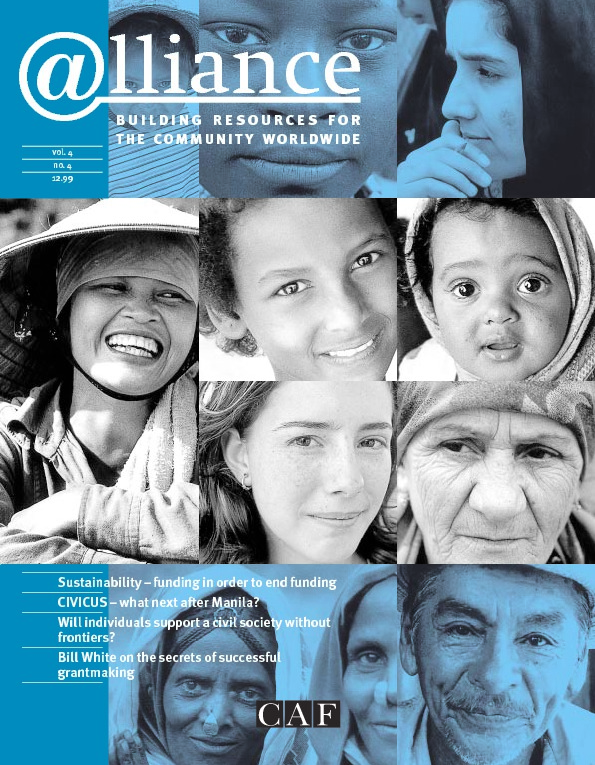‘Money ! You just can’t give it away’ screamed the headline in Sunday Business (London, 10 October). It was trailing an interview with Yahoo’s co-founder, Jerry Yang. ‘Learning how to be a contributor to the community is tough’ he went on to say. The foundation established by him and his wife is concentrating on grass-roots community-based projects.
Jerry Yang is one of an emerging group of business people who do not want to earmark money for some vague or remote philanthropic purpose. These ‘new philanthropists’ regard philanthropy as a form of investment. They often also bring their business skills to bear as part of a package of ‘giving’. They are essentially optimistic about the human condition. Having created wealth directly themselves, they now wish to offer others a hand up, not a hand out.
Seeing funding in terms of investment
This venture approach to philanthropy is not totally new. A growing number of donors of all sorts are becoming frustrated with the funding status quo where NGOs appear to be in an endless cycle of resource dependency, remaining purely consumers rather than generators of social wealth. Increasingly they are recognizing the need for projects to become sustainable, to become embedded in the community they serve.
Such approaches challenge the orthodoxy of the funder–beneficiary relationship. If we assume that pure grant funding is the most limited form of funding available and commercial capital relatively unlimited, then it must make sense to begin to consider funding in investment terms. This is leading to experimentation in new organizational structures: non-profit in purpose but for-profit in approach.
Stimulating a self-financing approach involves ‘investors’ working to develop more long-term relationships with NGOs by investing in their development and offering capacity-building as well as programmatic support. One such investor is Vanessa Kirsch, founder of the US-based New Profit Inc, a start-up organization for grantmaking, technical assistance and venture capital.
New attitudes among NGOs
Following this path also requires a fundamental reassessment of attitudes and perspectives on the part of the funded. It challenges the NGO to eschew the easy money option of outright grants, especially if they are ‘off mission’. In recent years in many countries NGOs have become agency providers of what would otherwise be statutory services. They now find themselves in dependent relationships, frightened to bite the hand that feeds them. This does not provide an environment for asset accumulation or wealth creation.
Providing the capital
In the USA, grants, loans and programme-related investments, as well as tools such as the Community Reinvestment Act, are providing the capital. This enables market-based approaches to social issues to be tried, where community enterprises produce goods and services which can then be sold, both generating wealth that can be used within the community and creating new jobs.
In the UK some funders are adding loans to their portfolio while others are supporting community finance initiatives such as CAF’s Investors in Society or the Aston Reinvestment Trust. These provide portals for new philanthropists or ‘finanthropists’ who may wish to engage with others through trusted intermediaries.
What is new about the emerging generation of philanthropists is their potential number and wealth, and the values, beliefs and approaches they bring. Globalization, new technology, corporate restructuring, and the transfer of wealth to a new generation may mark a new high point in wealth creation. While The Economist may not yet have noted too many new Carnegies or Rockefellers, they are there.
In 1972 Roger Waters wrote the song ‘Money’ for Pink Floyd.
‘ Money it’s a hit.
Don’t give me that do goody good bullshit.’
In the hands of the new wealth creators, money can be a powerful agent for change in our society.
Malcolm Hayday is Director of Community Finance at CAF. He can be contacted via email at mhayday@caf.charitynet.org


Comments (0)